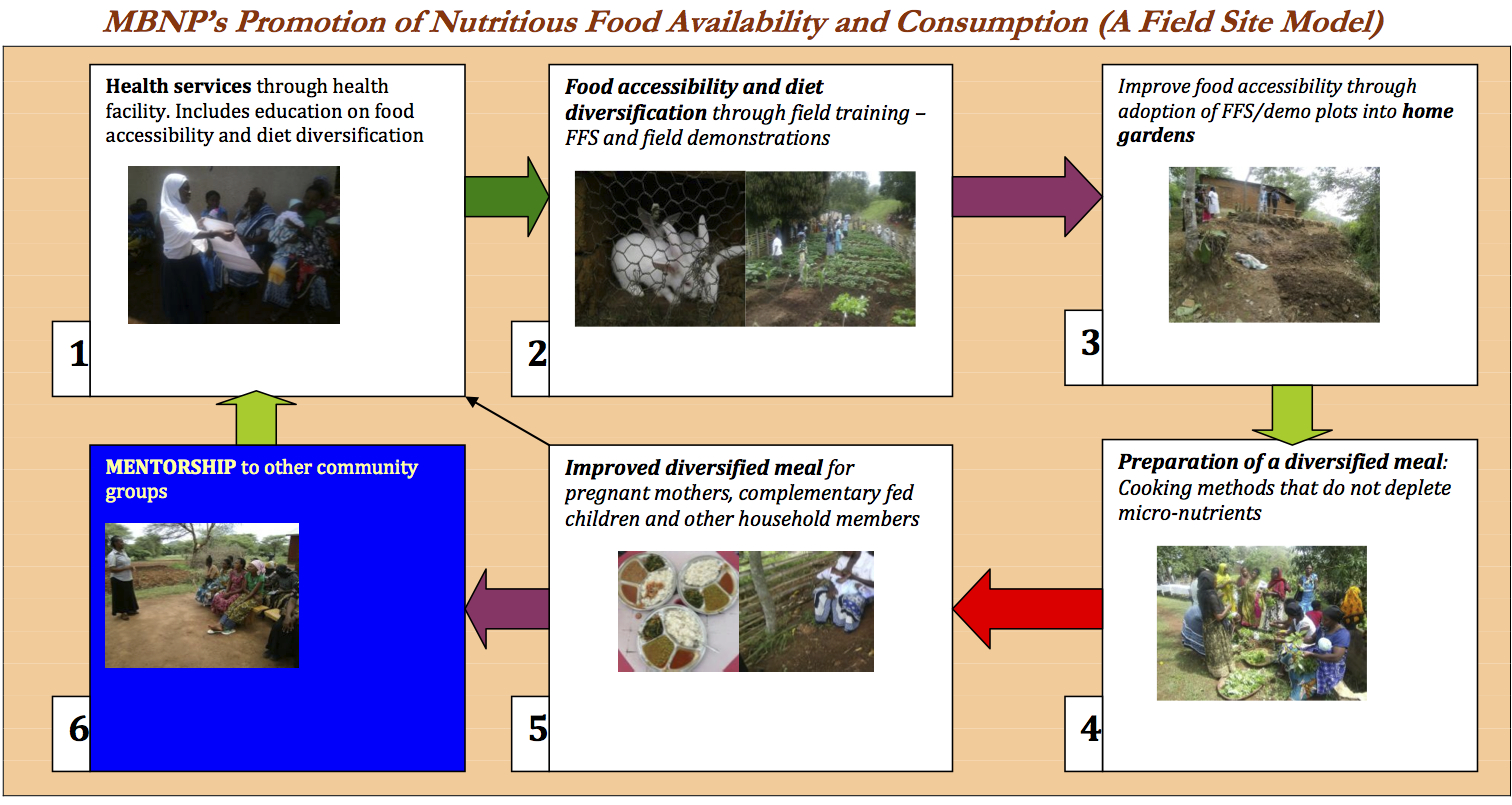Tanzania’s Mwanzo Bora: Promoting “good starts” in community agriculture and nutrition
In Tanzania, 53 percent of pregnant women are anemic, and 35 percent of children under three are stunted – both evidence of severe malnutrition. A five-year (2011-2016) USAID-funded project led by Africare, the Mwanzo Bora Nutrition Program (MBNP) integrates agriculture and nutrition to address a host of malnutrition issues in women and children across three major rural regions of Tanzania.
A child’s nutrient intake during the first 1,000 days of life, from in utero development to the second birthday, has more impact on growth and cognitive development than at any other period. Mwanzo Bora, which means “good start” in Kiswahili, focuses on the first 1,000 days of children’s lives and sustainably improves diet diversification and consumption through intensive community involvement, increased access to knowledge and resources, and social and behavior change communication.
In project regions, obstacles to nutrition include limited access to nutrient-rich food, an over-emphasis on growing produce for sale rather than consumption, and inadequate involvement of men in the diets of their children and wives.
To improve access to healthy foods, MBNP partners with local reproductive and child health centers to establish Farmer Field Schools/Demonstration plots (FFS/Demo plots). These provide hands-on experience in establishing and maintaining backyard gardens and small livestock to produce enough diverse foods for household consumption. The plots also supply beneficiaries with plant cuttings and animals for at-home replication.
FFS/Demo plot participants also learn to harvest and prepare produce while retaining optimal nutrients. Traditional methods of overcooking vegetables release nutrients before consumption, so participants learn to flash steam vegetables and to use every element, including the water used to boil them. MBNP has established 20 FFS/Demo plots across 10 districts, with plans for more as MBNP spreads into an additional 10 districts.
Twelve to 15 women and men tend each plot and also join in parental peer groups to discuss and learn about nutrition. Each group member is responsible for teaching another group of 12-15 community members how to establish their own plots. So far 712 groups (7,832 people) have been formed.

MBNP created an interactive social and behavior change communication kit for use by these peer support groups. Men and women separate for gender-related topics, but unite for shared subjects. Women are empowered to steer the nutritional health of their households and become community leaders against poor nutrition. Men are encouraged to take responsibility for the nutrient intake and health of mothers and children. Traditionally, women dominate in cooking and child-related duties, so MBNP teaches men to support their wives in these tasks, including ensuring pregnant women rest and eat as much as needed.
Participants engage in group sessions involving testimonial sheets, meal planning card games, and mobile phone instructional videos. The mobile phone videos are shared with participants via wireless Bluetooth technology, which allows access for all community members in the three regions. The videos demonstrate how to make “sack gardens” comprised of multiple vegetables growing in a sack of dirt requiring little water, and “tippy taps,” which are simple mechanisms for washing hands that help food handlers prevent the spread of disease.
To foster sustainability, local civil society organizations in the health and agriculture sectors are also trained on nutrition-related issues. These organizations then lead nutrition-focused activities and maximize community involvement. Health and agriculture officers host regular farmer field days, which include cooking demonstrations, training sessions and nutrition classes. These partners will ensure the sustenance of MBNP’s activities for years to come.
MBNP Mashed Sweet Potatoes
To round out a growing child’s diet, local nutrient-rich foods are recommended in addition to breast milk after six months of age. During cooking demonstrations on complementary feeding, participants learn to prepare MBNP’s special recipe of mashed sweet potatoes. Adults and babies both can enjoy this delicious and simple recipe, which is rich in healthy fats, protein, vitamin A, vitamin C and iron.
Ingredients
2 cups water
1 cup orange-flesh sweet potatoes, peeled and cubed
½ cup milk mixed with coconut flesh
1 teaspoon peanut butter
Pinch of salt
1 small carrot
½ cup green vegetables (amaranths), washed and pounded
Method
1. Boil the sweet potatoes, carrots and salt until well cooked.
2. Mash the sweet potatoes.
3. Add the milk until well mixed.
4. Add the pounded vegetables and bring the porridge to boil for 5 seconds.
5. Feed mixture to the child while it is still warm.
Note: Add butter if available to improve the energy value of the dish.
Yield: One and a half cups
Veronica Mills is a communications consultant from the U.S. currently based in Sub-Saharan Africa, where she works as a communications officer for Africare/Tanzania on the Mwanzo Bora Nutrition Program.
- Categories
- Health Care
- Tags
- nutrition, public health
